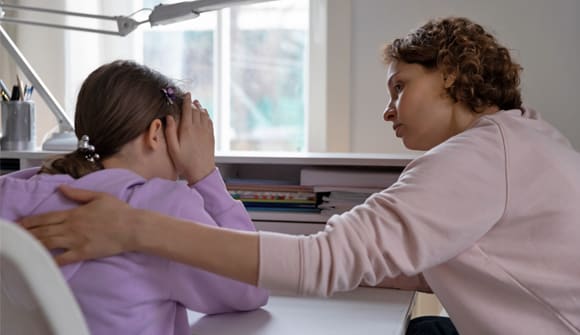Easing the burden
Helping kids cope with childhood trauma.
Article Author: Johnny Woodhouse
Article Date:

Challenging, sensitive, inflexible, easily frustrated. When used to describe children, these words often provoke negative emotions. In reality, kids and teens who are described this way – especially when they come from a history of harm – need a special method of caregiving that meets their unique needs.
Impact of adverse childhood experiences
Childhood trauma occurs when a child experiences an emotional or physical threat but is powerless to escape it.
According to a landmark study by the Centers for Disease Control and Prevention on the developmental consequences of trauma, 64% of the more than 17,000 participants said they had experienced at least one adverse childhood experience (ACE).
ACEs can include emotional, physical and substance abuse, domestic violence, and parental divorce or separation. The study found that one in eight participants had experienced four or more ACEs, including early hospitalization, such as a lengthy stay in a Neonatal Intensive Care Unit after birth.
"The burden these children carry can be quite heavy," said Jay Pigott, a licensed clinical social worker with Baptist Behavioral Health. "Children who have been through trauma often don't have the words to communicate how they're feeling; rather, it manifests in their behavior."
Over time, these burdens can affect not only a child's behavior but also their belief systems. According to the Children's Bureau, an agency within the U.S. Department of Health and Human Services, children may also have interrupted brain development, leading to functional impairments. Ongoing maltreatment can alter a child's brain development and affect mental, emotional, and behavioral health into adulthood.
TBRI training for parents and caregivers
Karyn Purvis, PhD, a developmental psychologist who co-founded a therapeutic summer day camp for adopted children, realized this, too. That's why she created Trust-Based Relational Intervention (TBRI) to help parents and caregivers meet the complex needs of children who have suffered trauma, abuse, neglect or other adverse conditions early in life, making it difficult for them to trust loving adults.
The approach offers practical, research-based tools and methods for calming a child down and teaching the skills needed to eliminate potentially problematic behaviors in the future.
"The basis of TBRI is to find the unmet need manifesting in what's often labeled 'bad' behavior. This helps us shift our perspective to get to the root of why a child is acting a certain way," Pigott said. "When we address the cause, we're able to meet the unfilled need and achieve real change in behavior. From there, we can get to a place of hope for both the child and their caregiver."
Helping kids form trusting relationships
Every child benefits from a nurturing and trusting relationship with a safe adult. One way to build that bond, according to Pigott, is to follow these seven simple engagement strategies.
1. Make eye contact. Being present and practicing active listening makes a child feel heard and understood.
2. Regulate your voice. Lower the volume and pitch of your voice when speaking to an overstimulated or stressed child.
3. Match their behavior. Get on a child's play and voice level to build a greater connection.
4. Give them structure. Create predictability and interaction through routines and rituals to help reduce the chaos a child may be experiencing.
5. Create safety zones. Guide an overwhelmed child to a quiet corner or safe place to allow them to decompress on their own.
6. Check their engines. Empowering a child also means making sure they have the proper amount of nutrition, hydration and sleep to succeed.
7. Offer a redo. Giving a child the opportunity to fix a bad behavior gives us the chance to praise them for it. It also allows the child to put the positive behavior into muscle memory, so they're more likely to repeat it the next time.
"It's important for caregivers to stay playful when attempting to correct behavior in order to promote connection and a feeling of safety," said Pigott. "For example, instead of putting a child in time out, TBRI teaches us to say something like, 'Do you want to try that again?' We aim to give children the chance to correct their behaviors, which can lead to real change."
Interested in Trust-Based Relational Intervention training in Northeast Florida?
Click here for upcoming training opportunities in the Jacksonville area. For more information about children's mental health services through Wolfson Children's Behavioral Health, call 904.376.3800.



